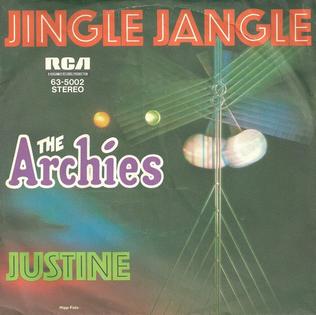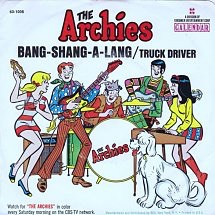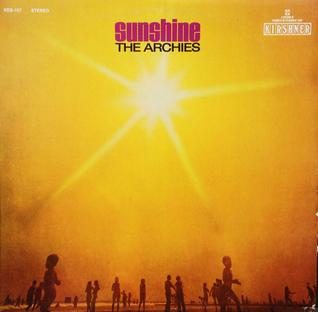
The Archies are an American fictional rock band featured in media produced by, and related to, Archie Comics. They are best remembered for their appearance in the animated TV series The Archie Show. In the context of the series, the band was founded by guitarist/vocalist Archie Andrews, drummer Jughead Jones, bassist Reggie Mantle, percussionist/vocalist Betty Cooper and keyboardist/vocalist Veronica Lodge. In the cartoons, Veronica is shown playing a large keyboard instrument styled after the X-66, a then-current top-of-the-line organ made by the Hammond Organ Company.

Androwis Youakim, better known as Andy Kim, is a Canadian pop rock singer and songwriter. He grew up in Montreal, Quebec. He is known for hits that he released in the late 1960s and 1970s: the international hit "Baby, I Love You" in 1969, and "Rock Me Gently", which topped the U.S. singles chart in 1974. He co-wrote "Sugar, Sugar" in 1968 and sang on the recording as part of the Archies; it was #1 for four weeks in the USA and was "Record of the Year" for 1969.

"Someday We'll Be Together" is a song written by Johnny Bristol, Jackey Beavers, and Harvey Fuqua. It was the last of twelve American number-one pop singles for Diana Ross & the Supremes on the Motown label. Although it was released as the final Supremes song featuring Diana Ross, who left the group for a solo career in January 1970, it was recorded as Ross' first solo single and Supremes members Mary Wilson and Cindy Birdsong do not sing on the recording. Both appear on the B-side, "He's My Sunny Boy".

"Love Child" is a 1968 song released by the Motown label for Diana Ross & the Supremes. The second single and title track from their album Love Child, it became the Supremes' 11th number-one single in the United States, where it sold 500,000 copies in its first week and 2 million copies by year's end.

"I Can't Get Next to You" is a 1969 No. 1 single recorded by the Temptations and written by Norman Whitfield and Barrett Strong for the Gordy (Motown) label. The song was a No. 1 single on the Billboard Top Pop Singles chart for two weeks in 1969, from October 18 to October 25, replacing "Sugar, Sugar" by the Archies and replaced by "Suspicious Minds" by Elvis Presley. The single was also a No. 1 hit on the Billboard Top R&B Singles for five weeks, from October 4 to November 1, replacing "Oh, What a Night" by the Dells, and replaced by another Motown song, "Baby I'm For Real" by the Originals.

"Medley: Aquarius/Let the Sunshine In " is a medley of two songs written for the 1967 musical Hair by James Rado and Gerome Ragni (lyrics), and Galt MacDermot (music), released as a single by American R&B group the 5th Dimension. The song spent six weeks at number one on the US Billboard Hot 100 pop singles chart in the spring of 1969 and was eventually certified platinum in the US by the RIAA. Instrumental backing was written by Bill Holman and provided by session musicians commonly known as the Wrecking Crew. The actual recording was novel at the time, being recorded in two cities, Los Angeles and Las Vegas, and being mixed down to a final version later.

"Chirpy Chirpy, Cheep Cheep" is a song recorded in 1970 by its composer Lally Stott, and made popular in 1971 by British band Middle of the Road for whom it was a UK #1 chart hit. That version is one of fewer than fifty singles to have sold more than ten million physical copies worldwide.

The Cuff Links were an American rock/pop studio group from Staten Island, New York, United States. The ostensible band had a US No. 9 hit in 1969 with "Tracy", with rich harmonized vocals provided entirely by Ron Dante. The track was produced as part of a series of recording sessions – sometimes as many as six in a day – by Dante, with the songs released under a variety of band names. Dante left the act after their first album; on later singles vocals were provided by Joey Cord and/or Rupert Holmes.

"Jean" is a popular song from the 1969 movie The Prime of Miss Jean Brodie. It was written by the American poet and composer Rod McKuen, who also recorded a version of the song.

"Indian Lake" is a song with music and lyrics written by Tony Romeo. It was recorded by the pop band The Cowsills, and included on their 1968 album Captain Sad and His Ship of Fools. Released as a single, the song reached No. 10 on the Billboard Hot 100, while reaching No. 6 on the Cash Box Top 100, and No. 3 on Canada's RPM 100. The song was ranked as the No. 51 Single of 1968 by Cashbox magazine in its year-ending December 28, 1968 issue. The single eventually sold over 1 million copies, and was later licensed for use in commercials for the Dodge Charger.

Everything's Archie is the second studio album by The Archies, a fictional bubblegum pop band from Archie Comics. It was produced by Jeff Barry and released on the Calendar Records label in 1969. The album's first single, "Feelin' So Good (S.K.O.O.B.Y.-D.O.O.)", peaked at No. 53 on the Billboard Hot 100 chart. The album's second single, "Sugar, Sugar", peaked at No. 1 on the pop chart, selling over six million copies and being awarded a golden disc; it was ranked as the number one song of the year in 1969, according to Billboard. The album peaked at No. 66 on the Billboard 200 chart. As of September 1969, the album sold over 700,000 copies.

"Jingle Jangle" is a song written by Jeff Barry and Andy Kim, produced by Barry and recorded by The Archies, a fictional bubblegum pop band from Archie Comics. It was released as the group's fourth single on the Kirshner Records label in November 1969, and included on their third album, Jingle Jangle. It reached number 10 on the Billboard Hot 100 and number 27 on the U.S. Easy Listening chart in 1969. In January 1970, it went to number 1 for one week in Canada.

The Archies is the debut studio album by The Archies, a fictional bubblegum pop band from Archie Comics. It was produced by Jeff Barry, co-produced by Don Kirshner and released on the Calendar Records label in 1968. The album includes the band's debut single, "Bang-Shang-A-Lang", which peaked at No. 22 on the Billboard Hot 100 chart. The song "Seventeen Ain't Young" became a Top 40 hit in Australia for Frank Howson. The album peaked at No. 88 on the Billboard 200 chart.

"Bang-Shang-A-Lang" is a song written and produced by Jeff Barry, and recorded by The Archies, a fictional bubblegum pop band from Archie Comics. It was released as the group's debut single on the Calendar Records label on August 31, 1968, and included on their self-titled album. It peaked at No. 22 on the Billboard Hot 100 chart.

"Sunshine" is a song written by Jeff Barry and Bobby Bloom, produced by Barry and recorded by The Archies, a fictional bubblegum pop band from Archie Comics. It was released as the group's sixth single on the Kirshner Records label in 1970, and included on their fourth album, Sunshine. It peaked at No. 57 on the Billboard Hot 100 chart; it is their last Hot 100 hit to date.

Sunshine is the fourth studio album by The Archies, a fictional bubblegum pop band from Archie Comics. It was released on the Kirshner Records label in 1970. All tracks were produced by Jeff Barry, with the exception of four songs, which were written and produced by Neil Brian Goldberg; they were mistakenly credited to Barry, as Goldberg was a staff writer working under Barry's supervision at the time. The album's first single, "Sunshine", peaked at No. 57 on the Billboard Hot 100 chart. The album's second single, "A Summer Prayer For Peace", was only released overseas and topped the charts in South Africa. The album peaked at No. 137 on the Billboard Top LPs chart.

"Who's Your Baby?" is a song written by Jeff Barry and Andy Kim, produced by Barry and recorded by The Archies, a fictional bubblegum pop band from Archie Comics. It is a non-album single, released on the Kirshner Records label on February 28, 1970. Its B-side, "Senorita Rita", was included on the group's third album, Jingle Jangle. It peaked at No. 40 on the Billboard Hot 100 chart. It is their last top 40 hit.

"Easy Come, Easy Go" is a song written by Jack Keller and Diane Hildebrand that was a hit single for Bobby Sherman in 1970.
This is the discography of American bubblegum pop band the Archies.



















